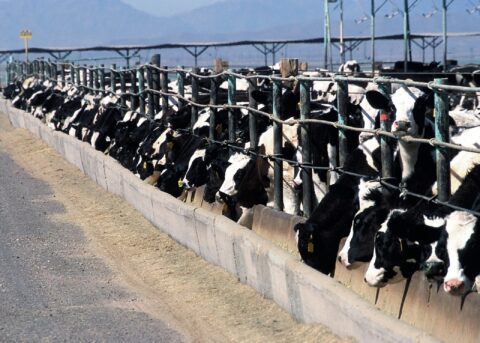Solutions
Shareholder Activists Push Fast Food Chains to Commit to Climate Targets
Climate•4 min read
Reported
The climate science community, for over a decade now one of the most vocal defenders of factual scientific information, will not be able to leave animal agriculture off its agenda for much longer.


Words by Mikko Jarvenpaa
The Global Climate Action Summit in San Francisco has during its two first days focused mostly on energy, inclusive economic growth, and sustainable stewardship of land and ocean resources. Animal agriculture isn’t one of the main challenge areas at GCAS, which is vexing, to say the least given the massive impact of animal agriculture on the climate. As if to illustrate how disproportionately low weight the event gives to the problem, GCAS has welcomed McDonald’s as one of its sponsors.
Yet the topic has not gone unheard. On Thursday, two pledges relevant to reducing the environmental effects of animal agriculture were announced, and in a luminary session with Jane Goodall, both her and Alec Baldwin made the unequivocal point that both meat and dairy consumption must be reduced for the planet to fight deforestation and greenhouse gas emissions, and to reduce wasteful water use. Goodall included farm animal suffering in the discussion and gave a brief platform to her plush toy cow, which accompanied her more familiar companion, the plush toy monkey. While the delivery was entertaining, the message was serious.
Alec Baldwin: will people change their diets in the US?
Jane Goodall: I see it changing already. I used to get weird looks when I ordered vegetarian meals, not anymore… #shiftingdiets #GCAS2018 #StepUp2018 pic.twitter.com/YvYTJn6sdU— Richard Waite (@waiterich) September 13, 2018
“Many people stop eating meat because of the cruelty in the intensive farms, which are being created for the growing demand for meat around the world,” said Goodall, and that even if one doesn’t care about how “sentient and sapient” they are, and how the cows “love their calves as much as we love our children,” the problem still remains that huge areas of forest are cleared to feed the animals that then feed the humans. This process of deforestation itself requires fossil fuels, as does processing and transporting the food and the slaughtered animal itself.
“Added to that, huge amounts of water are wasted to turn vegetable protein into animal protein,” Goodall said. “More grain and soy is grown in the United States to feed animals than to feed people, which is a kind of a shock.” The methane created by cows is a more vicious gas environmentally than carbon dioxide is, and finally, to be kept alive, the animals need antibiotics that in turn generate bacteria resistant to them.
Jane Goodall and @AlecBaldwin talk about how eating less meat and dairy can save forests and stop climate change @GCAS2018 @JaneGoodallInst pic.twitter.com/k4rSGQMmsa
— Erin Biehl (@erinbie) September 13, 2018
For all of these reasons, eating less meat is important, said Goodall (and less dairy, chimed in Baldwin). Goodall herself said that she changed her ways when she, upon learning about what really goes on in factory farms, realized that the meat on her plate was symbolic of fear, pain, and death. “And do we really want to eat fear, pain, and death?”
World Resources Institute announced the Cool Food Pledge, “a new platform to help facilities offer diners more of what they want while slashing food-related greenhouse gas emissions by 25 percent by 2030.” With a founding coalition of 10 member organizations and companies that between them serve 60 million meals annually, the signatories promise to provide delicious food that is better for the planet. The pledge announcement mentions how there is growing demand for more plant-based and sustainable foods on both sides (PDF) of the Atlantic.
And this is just the start. World Resources Institute aims to have 250 signatories on the pledge by 2021.
Separately on the financial side, Ceres announced a coordinated statement by investors managing a whopping $6.4 trillion in assets for eliminating deforestation specifically in the cattle supply chain. Among other things, the statement calls for “stronger awareness and governance regarding deforestation risks, including oversight at the board of directors level” and “traceability across the entire cattle supply chain.” The entire statement is available as a PDF here.
The long list of events affiliated with the Global Climate Action Summit contained a fair few food-related events. On Thursday night, WeWork Embarcadero hosted sf.citi’s event “Future of Food: Tech’s Menu for Sustainability” to a sold-out crowd and served fully plant-based fare from multiple local suppliers. For tasting were Impossible Burgers, plant-based sushi, Om Sabor’s mushroom nachos, and Just’s cookie dough cups, with platefuls of others.
Plant-based food wasn’t an exciting topic just because of its lower environmental impact, and the potential to eliminate animal suffering. Access to healthy food is also a matter of social justice. In the evening’s panel, Josh Tetrick, CEO of JUST, said that “eating well should be a basic right.” Katerina Robinson, Legislative Director for CA Senator Nancy Skinner’s office agreed, saying that it is a matter of equity and that only by building a wide coalition of interested parties will the change to plant-based food systems happen without the issue becoming polarized.
The climate science community, for over a decade now one of the most vocal defenders of factual scientific information, will not be able to leave animal agriculture off its agenda for much longer. It is the second larger contributor of human-derived greenhouse gases and a major destroyer of ecosystems across the planet.
Changing human consumption patterns may be inconvenient and culturally difficult (undoubtedly even to many in the climate community), but it is also the one climate action that causes very little disruption to day to day business and has immediate impacts in an individual’s climate footprint. Perhaps next year animal agriculture will be center stage at the summit.